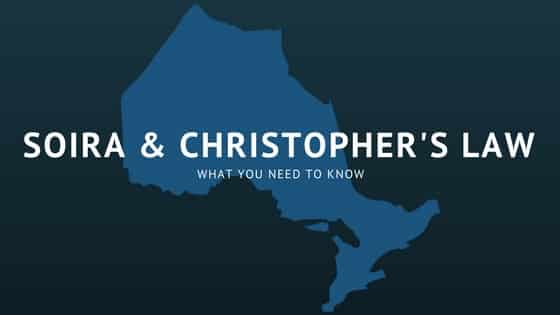Who must comply with SOIRA & Christopher’s Law?
If a person is convicted of a designated sexual offence in Ontario, or is found to be not criminally responsible on account of mental disorder for such an offence, he or she will be required to comply with the Sex Offender Information Registration Act (Canada) (“SOIRA”) and/or the Christopher’s Law (Sex Offender Registry), 2000 (Ontario) and register with the National Sex Offender Registry (“NSOR”) and/or the Ontario Sex Offender Registry (“OSOR”) under those statutes, respectively, for the applicable period(s). These registry databases are accessible by all police forces in each jurisdiction.
While the requirements under SOIRA and Christopher’s Law are similar, and generally apply to the same designated sexual offences, it should be noted that there are some differences between the regimes, and in some cases a convicted person may be required to comply with one regime and not the other.
What is required if you must comply with SOIRA & Christopher’s Law?
The process for complying with both the SOIRA and Christopher’s Law regimes is substantially the same. Persons required to comply with either regime must register in person at a designated registration centre initially within seven days (SOIRA) or 15 days (Christopher’s Law) after the order is made or they are released from custody (whichever is later) and thereafter annually. Persons required to comply with either regime must also register in person within seven days (SOIRA) or 15 days (Christopher’s Law) after any change in the person’s key information, including their name, address, driver’s licence or passport.
If a person is required to comply with both SOIRA and Christopher’s Law, he or she will satisfy his or her reporting obligations under both regimes by reporting at a designated registration centre.
What information is maintained in the registration databases for SOIRA & Christopher’s Law?
The information maintained under the NSOR and the OSOR includes the following information about the convicted person:
- Name and aliases
- Date of birth
- Current address(es)
- Home, personal, and business telephone and fax numbers
- Current photograph
- Height, weight and any identifying marks
- Vehicle information (licence plate number, make, model, colour, etc.)
- Driver’s Licence Number and Passport Number
- Name and address of employer and any organizations at which the person volunteers
- Name and address of any educational institution at which the person is or has enrolled, attended, or worked
- Particulars about the person’s convictions and sentences, the circumstances of the offences, fingerprint registration
How long must one comply with SOIRA & Christopher’s Law?
An order to comply with SOIRA:
- ends 10 years after it was made if the offence in connection with which it was made was prosecuted summarily or if the maximum term of imprisonment for the offence is two or five years;
- ends 20 years after it was made if the maximum term of imprisonment for the offence is 10 or 14 years; and
- applies for life if the maximum term of imprisonment for the offence is life.
A person required to comply with Christopher’s Law must do so:
- for 10 years after he or she first reports if the maximum sentence for the offence is not more than 10 years;
- for life if the maximum sentence for the offence is more than 10 years or the offender has been convicted of more than one sex offence;
What are the exceptions? Who does not have to comply with SOIRA & Christopher’s Law?
Youth do not have to comply with SOIRA & Christopher’s Law
Young persons, as defined in the Youth Criminal Justice Act, convicted of designated sexual offences under the Youth Criminal Justice Act are not subject to either regime unless they are sentenced as an adult and the court makes a SOIRA order.
Persons Outside Jurisdiction do not have to comply with SOIRA & Christopher’s Law
A person is not required to comply with either regime so long as the person is outside the jurisdiction. However, the person must notify the authorities before leaving the jurisdiction, or within seven days after the day on which any change is made, of the dates of their departure and return and every address and location at which they expect to stay in Canada or outside Canada, and the person must report within seven days after their return if they were required to report while they were outside the jurisdiction.
Persons who receive a Pardon or Record Suspension do not have to comply with SOIRA & Christopher’s Law
Also, a person is no longer required to comply with either regime if the person receives a pardon or a record suspension for every offence for which he or she is required to comply with SOIRA and/or Christopher’s Law.
Persons granted Early Termination do not have to comply with SOIRA & Christopher’s Law
A person who is required to comply with SOIRA may apply for a termination of the order after the expiry of specified time periods determined by the duration of the SOIRA order. Also, a person may apply for a termination of the SOIRA order once the person receives a pardon or once a Record Suspension is granted.
One of the key differences between the federal and provincial regimes is that Christopher’s Law does not contain an exemption or termination process. That said, an offender who has received a pardon or Record Suspension may apply to be deleted from the OSOR.
What are the designated sexual offences requiring a mandatory SOIRA & Christopher’s Law order?
The designated offences requiring a mandatory SOIRA order are listed in Section 490.011(1)(a) of the Criminal Code and are as follows:
- Section 7(4.1) offence in relation to sexual offences against children
- Section 151 sexual interference
- Section 152 invitation to sexual touching
- Section 153 sexual exploitation
- Section 153.1 sexual exploitation of person with disability
- Section 155 incest
- Section 160(2) compelling the commission of bestiality
- Section 160(3) bestiality in presence of or by a child
- Section 163.1 child pornography
- Section 170 parent or guardian procuring sexual activity
- Section 171.1 making sexually explicit material available to a child
- Section 172.1 luring a child for a sexual purpose
- Section 172.2 agreement or arrangement – sexual offence against child
- Section 173(2) exposure of genitals to a person under the age of 16 years
- Section 212(1)(i) stupefying or overpowering for the purpose of sexual intercourse
- Section 212(2) living on the avails of prostitution of a person under the age of 18 years
- Section 212(2.1) living on the avails of prostitution of a person under the age of 18 years and counselling or using threats or coercion against that person for purposes of profit
- Section 212(4) obtaining, or communicating for the purposes of obtaining, the sexual services of a person under the age of 18 years
- Section 271 sexual assault
- Section 272 sexual assault with a weapon, threats to a third party or causing bodily harm
- Section 273(2)(a) aggravated sexual assault – use of a restricted firearm or prohibited firearm or any firearm in connection with criminal organization
- Section 273(2)(a.1) aggravated sexual assault – use of a firearm
- Section 273(2)(b) aggravated sexual assault
- Section 273.3 removal of a child from Canada with the intent to commit a sexual act in respect of that child
In addition, the Criminal Code provides that when a court imposes a sentence on a person for certain additional designated offences, the court must, on application of the Crown prosecutor, make an order requiring the person to comply with the provisions of SOIRA if the Crown prosecutor establishes beyond a reasonable doubt that the person committed the offence with the intent to commit a further sexual-related offence.
The additional designated offences are listed in Section 490.011(1)(b) and are as follows:
- Section 162 voyeurism
- Section 173(1) indecent acts
- Section 177 trespassing at night
- Section 230 murder in commission of offences
- Section 231 murder
- Section 234 manslaughter
- Section 246(b) overcoming resistance to commission of offence
- Section 264 criminal harassment
- Section 279 kidnapping
- Section 279.01 trafficking in persons
- Section 279.011 trafficking of a person under the age of 18 years
- Section 280 abduction of a person under the age of 16 years
- Section 281 abduction of a person under the age of 14 years
- Section 348(1)(d) breaking and entering a dwelling house with intent to commit an indictable offence
- Section 248(1)(d) breaking and entering a dwelling house and committing an indictable offence
- Section348(1)(e) breaking and entering a place other than a dwelling house with intent to commit an indictable offence
- Section 348(1)(e) breaking and entering a place other than a dwelling house and committing an indictable offence
- Section 490.012 has been interpreted as not applying to a person that is granted an absolute or conditional discharge. In other words, a person who is granted an absolute or conditional discharge cannot be ordered by the Judge to comply with the provisions of SOIRA.
A “sex offence” for purposes of Christopher’s Law includes convictions for the following offences:
- Section 151 (sexual interference)
- Section 152 (invitation to sexual touching)
- Subsection 153(1) (sexual exploitation)
- Subsection 155 (1) (incest)
- Subsection 160 (1), (2) or (3) (bestiality)
- Subsection 163.1 (2), (3) or (4) (child pornography)
- Section 170 (parent or guardian procuring sexual activity)
- Subsection 173 (2) (exposure)
- Section 271 (sexual assault)
- Subsection 272 (1) (sexual assault with a weapon, threats to a third party or causing bodily harm)
- Section 273 (aggravated sexual assault) of the Criminal Code (Canada)
- an offence referred to in paragraph (b) or (f) of the definition of “designated offence” in subsection 490.011 (1) of the Criminal Code (Canada) in respect of which an order in Form 52 has been or is made under subsection 490.012 (2) of that Act
- an offence in respect of which a person is subject to an obligation under section 490.02901 of the Criminal Code (Canada) to comply with the Sex Offender Information Registration Act (Canada)
- an offence in respect of which a person is subject to an obligation under section 36.1 of the International Transfer of Offenders Act (Canada) to comply with the Sex Offender Information Registration Act (Canada)
- Subsection 7(4.1) (sexual offence against children by a Canadian citizen outside Canada)
- Section 153.1 (sexual exploitation of person with disability)
- Subsection 163.1(4.1) (accessing child pornography)
- Section 171.1 (making sexually explicit material available to child)
- Section 172.1 (luring a child)
- Section 172.2 (agreement or arrangement — sexual offence against child)
- Paragraph 212(1)(i) (stupefying or overpowering for the purpose of sexual intercourse)
- Subsection 212 (2) (living on the avails of prostitution of a person under 18)
- Subsection 212 (2.1) (aggravated offence — living on the avails of prostitution of a person under 18)
- Subsection 212 (4) (purchasing sexual services of a person under 18)
- Subsection 273.3 (2) (removal of a child from Canada for sexual offence purpose)
- Section 24 (attempt to commit a sex offence)
- Paragraph 465 (1) (c) or subsection 465 (4) (conspiracy to commit a sex offence)
Share this Page
About Mark Hogan – Criminal Lawyer in Mississauga, Ontario

Mark Hogan defends criminal charges such as Assaults, Domestic Assault, Assault with a Weapon, Aggravated Assault, Sexual Assault, Uttering Threats, Forcible Confinement, Criminal Harassment, Bail Hearings, Drug Production, Drug Possession, Drug Trafficking, Fraud, Impaired Driving, Over 80, Refuse to Provide a Breath Sample, Theft, Robbery, and Breaking and Entering in Southern Ontario including Toronto GTA, Mississauga, Hamilton, Burlington, Milton, Brampton, Newmarket, Ajax, Pickering and Oshawa.
If you have been charged with a criminal offence, call Mark Hogan Criminal Defence Lawyer today for a FREE CONSULTATION! Call (416) 200-7005 (24/7).

